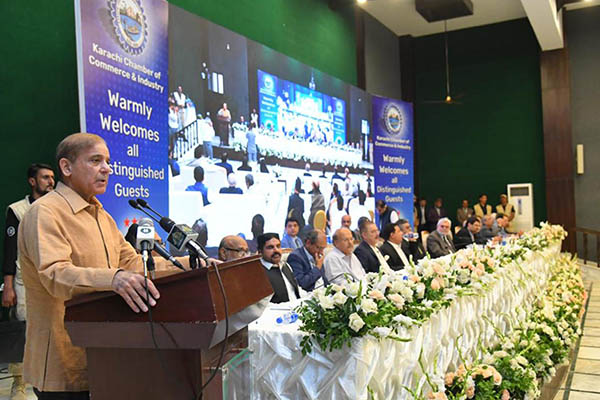
Photo courtesy PID
Prime Minister Shehbaz Sharif on Friday defended his government’s decision to ban the import of non-essential “luxury” items, saying the country’s “elite” must be prepared for some sacrifices during the difficult times facing Pakistan.
In a speech at the Karachi Chamber of Commerce and Industry, he said that the import ban would apply for a few months. He also clarified that he had opted for an outright ban rather than increasing duties because “the elite class would have still purchased imported items after paying duties.” This, he warned, would have still impacted the country’s foreign exchange reserves.
Stressing that his goal was to stabilize the Pakistani rupee, which has been rapidly sliding against the U.S. dollar for the past two weeks, he said this could best be achieved by increasing sales of locally-produced goods and discouraging imports. Hoping that his government would succeed in implementing plans to bring the economy back on track, he added: “I believe that the country will flourish once people unite. We will move forward with everyone by our side.”
Referring to the currency exchange rate, he said the greenback had been equal to Rs. 115 in August 2018 when the Pakistan Tehreek-e-Insaf (PTI)-led government came into power and had soared to Rs. 189 when he took his oath of office on April 11. “We [coalition government] had nothing to do with the Rs. 60-65 increase,” he said, adding that the Pakistani rupee had actually improved immediately after he assumed office, while the stock market had also soared by almost 1,000 points.
Emphasizing that he did not wish to indulge in political point-scoring, he regretted that the former government had announced a fuel subsidy after it became clear it would be ousted through a no-confidence motion. Questioning the timing of the relief provided by the subsidy, he said oil prices were the highest they had ever been globally and Pakistan was burdened with debt.
The prime minister—reflecting some of the frustration that has been voiced by other members of his federal cabinet in recent days—also lamented the support given by the military establishment to the ousted PTI-led government and former prime minister Imran Khan. “In our 75-year history, nobody has or will ever receive the same support,” he said. “If any of our governments had received even 30 percent of the same [level of] support, Pakistan’s trajectory would have shot up like a rocket,” he said.
Referring to the current surge in loadshedding, Sharif asked the crowd whether it had been caused by “political instability or the worst corruption, incompetence and lack of planning?” He said the PTI-led government had inflicted an economic crisis on the country, and now his government would take steps necessary to reverse it.
Investment plan
During the prime minister’s speech, he also urged businessmen from Karachi to devise a plan for an investment of $1 billion dollars from Saudi Arabia. “$1 billion is available, it is a gift of investment from Saudi Arabia. As the prime minister, I am laying this in front of you. Sit together and brainstorm and make a feasibility plan. Set up a desalination plant and I believe that clean water will be available at every home [in Karachi] within five years,” he said, referring to the Sindh capital’s chronic water shortage. “Now it is up to you. This investment is available. It is on the table,” he said, adding that he had told Finance Minister Miftah Ismail that he wanted to use these funds for Karachi.
During his daylong visit to the Sindh capital, the prime minister also attended the launching ceremony at the Karachi Shipyard and Engineering Works for the third MILGEM Corvette built by Turkey. “I would like to avail this opportunity to propose that let this—CPEC—be a trilateral arrangement between China, Pakistan and Turkey and let us benefit from its wonderful potential to benefit our nations,” he said, adding that this project was a “great example” of cooperation between Pakistan and Turkey.
